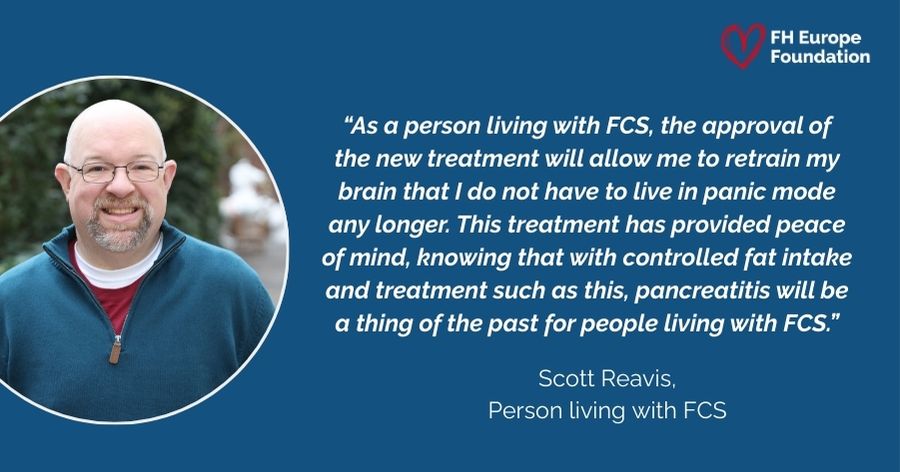Recently, US health regulators (the Food and Drug Administration, FDA) green‑lit a new treatment for adults with familial chylomicronaemia syndrome (FCS), a rare and often devastating genetic disease. For people who face this condition every day, the decision represents more than just a new drug on the market. It offers real hope for a life with fewer crises, less fear, and more normality.
FCS is caused by inherited mutations (most commonly affecting the enzyme lipoprotein lipase, or LPL) that impair the body’s ability to break down certain fats carried in the blood called chylomicrons.
As a result, affected individuals often have dangerously high triglyceride levels, sometimes above 880–1,000 mg/dL (much higher than the normal range). This can lead to frequent, severe episodes of acute pancreatitis, chronic abdominal pain, digestive problems, fatigue, “brain fog,” and other complications like diabetes or liver issues.
The condition imposes a heavy daily burden: many patients must follow a very strict, extremely low-fat diet (often less than 15−20 g of fat per day), avoid alcohol and simple sugars, and live with a constant risk of sudden, life-threatening pancreatitis.
Because of its rarity and severity, FCS has historically lacked targeted treatments; a reality that has long left patients and physicians frustrated and anxious.
The newly approved therapy works by silencing a gene that produces a protein called apolipoprotein C-III (apoC-III). In people with FCS, apoC-III contributes to the accumulation of triglyceride-rich chylomicrons by slowing down their clearance from the blood. By reducing the production of apoC-III in the liver, the drug enables much faster breakdown and removal of these fat particles, helping to bring triglyceride levels down dramatically and sustainably.
In a pivotal clinical trial, patients receiving the drug saw a median reduction of around 80% in triglyceride levels, and, more importantly, a significant reduction in the risk of acute pancreatitis, a life-threatening complication.
For people living with FCS, these results could be life-changing. The prospect of fewer hospitalisations, fewer pancreatitis attacks, and a more manageable everyday life could lift a heavy burden. For many families, this approval brings hope for a future that feels closer to normal.
Beyond the numbers, the psychological and social impact may also be profound. Patients often describe FCS as invisible to others but ever-present in their daily lives, with diet restrictions, fear of flare-ups, and anxiety about long-term health. This new therapy could offer relief not only to the body, but also to the mind.

While this approval marks a major advance, it does not eliminate all challenges. The treatment is intended as an adjunct to diet, not a replacement for healthy eating and lifestyle adjustments.
Moreover, long-term real-world experience remains to be gathered: how the therapy performs over many years, how accessible and affordable it will be to patients worldwide, and how individuals will adapt their lives around it.
Still, for a community that has long endured uncertainty, severe restrictions, and life‑threatening crises, this represents a turning point. It is a message that science can, and does, deliver hope.
Read the official press release here.
(this announcement contains information originally published by Arrowhead Pharmaceuticals. We are sharing it for general awareness because it may be relevant to people affected by FCS. This link directs to external content created by Arrowhead Pharmaceuticals and sharing it does not imply endorsement of any product, treatment, or organisation.)
Prepared by
 Dr. Marina Leroy,
Dr. Marina Leroy,
FH Europe Foundation Scientific Communications Manager
November brought strong progress for FH Europe Foundation, with impactful advocacy, a successful Annual Network Meeting and growing recognition for prevention-focused projects.
FH Europe Foundation News:
Ambassador Programme News
Research & Community Engagement:
Network News & Partner News:
News from around the World:
Knowledge Hub:
Events:
Magdalena Daccord, CEO of the FH Europe Foundation, has been selected by the World Health Organisation (WHO) as an expert member of the Guideline Development Group (GDG) on dyslipidaemia.
She will contribute strictly in her individual and independent capacity, in full accordance with WHO rules, and not on behalf of any organisation.
The WHO, the United Nations agency responsible for global public health, has launched the development of a new global guideline on the management of dyslipidaemia for the primary and secondary prevention of cardiovascular disease.
WHO guidelines are not legally binding, but they do carry significant global influence. Their impact comes from their role in setting international standards and shaping national policies and clinical practice, particularly in low- and middle-income countries. The degree to which countries adopt WHO guidelines depends on the strength of the evidence, the clarity of the recommendations, and how well these align with national priorities and health systems. While WHO cannot enforce implementation, its authority as a global health body and the high uptake of strong recommendations give its guidelines considerable weight worldwide.
The forthcoming guidelines will focus exclusively on adults aged 40+, reflecting WHO’s mandate to address cardiovascular risk in mid-life and older populations.
However, early expert exchanges already highlight a crucial truth: For inherited (genetic) lipid disorders—such as familial hypercholesterolaemia—screening and detection must begin as early in life as possible.
Early diagnosis has a lifelong impact on cardiovascular outcomes, and we hope future global recommendations will reflect this essential need.
FHEF is also proud to note the selection of two exceptional lipid experts with strong ties to our community: Prof. Jeanine Roeters van Lennep and Prof. Kirsten Holven.
Their expertise significantly strengthens the scientific foundation of this important global effort.
Biographies of the proposed members of the Guideline Development Group (GDG) are available here.
The World Health Summit 2025 delivered a clear message: global health systems are under pressure because we treat disease too late, not because prevention is impossible. For cardiovascular disease (CVD) and inherited lipid disorders, the summit’s conclusions strongly reinforce the need for earlier detection, stronger primary care, and policies that support long-term prevention.
Speakers across sessions highlighted overwhelming evidence: prevention delivers major health and economic returns, yet remains chronically underfunded. Early screening for cholesterol, hypertension, and inherited lipid disorders can dramatically reduce CVD risk and relieve health system pressure.
For our community, this means pushing for national adoption of family-based and genetic screening, and integrating lipid testing into routine preventive care.
UNICEF, WHO, and others stressed that lifelong cardiovascular risk is shaped early. Diet, physical activity, air quality, and safe environments influence heart and metabolic health long before adulthood.
This reinforces the importance of early diagnosis of inherited lipid disorders like FH, alongside child- and family-focused prevention strategies.
From liver health to cardiovascular disease, the summit highlighted a shift toward precision prevention — using genetics, biomarkers, imaging, and AI to identify risk early and act proactively.
For inherited lipid disorders, this approach is already central: early identification, monitoring across the life course, and tailored interventions for families.
The call to strengthen primary healthcare was consistent across WHS. Routine checks for blood pressure, cholesterol, and metabolic risk—supported by digital tools—are essential to reducing premature CVD deaths.
For lipid disorder communities, primary care is key to early detection and continuous management
The upcoming EU Cardiovascular Health Plan puts prevention and early detection at the centre of European policy. Its emphasis on “knowing your numbers,” digital tools, and routine checks aligns directly with the needs of people living with FH, Lp(a), and related conditions.
WHS speakers highlighted persistent gaps in women’s cardiovascular care: later diagnoses, misinterpreted symptoms, and limited participation in clinical research.
For inherited lipid disorders, sex-specific risk and care—especially during pregnancy and menopause—must become standard practice.
Climate, air pollution, food systems, and inequality were recognised as major contributors to cardiovascular and metabolic diseases. Effective prevention requires whole-of-society action, from healthier cities to stronger health literacy, not just clinical interventions.
WHS 2025 underscored that sustainable health systems depend on prevention, early detection, and equitable access to care. For the cardiovascular and inherited lipid disorders community, the path forward is clear:
If prevention becomes the backbone of policy and practice, we can change the trajectory of cardiovascular disease and protect future generations from preventable risks.
Read the full report here.